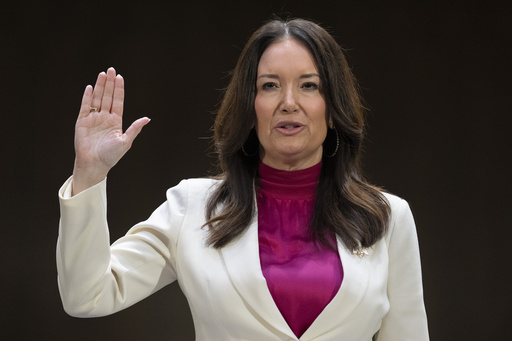
WASHINGTON — Brooke Rollins, a conservative legal expert, was officially confirmed on Thursday as the Secretary of Agriculture. This appointment places an ally of President Donald Trump in a crucial role at a time when significant changes in immigration policy could potentially lead to challenges in farm labor, as well as the implementation of tariffs that might affect agricultural exports.
In a decisive Senate vote of 72 to 28, Rollins, who previously held the position of chief of domestic policy during Trump’s first term, was approved to lead the Department of Agriculture. This department is responsible for managing nearly every facet of the nation’s food system, which encompasses regulations on farming methods, livestock management, providing fiscal support to farmers and agribusinesses, and establishing nutrition guidelines for schools and public health organizations across the country.
During Trump’s previous administration, the Department of Agriculture played a pivotal role in the trade conflicts, particularly when it expanded subsidies for farmers producing major crops such as corn and soybeans after China imposed retaliatory tariffs on these goods, leading to upheaval in global markets. The United States is recognized as the largest food exporter worldwide.
In her confirmation hearing, Rollins acknowledged the possible repercussions of Trump’s aggressive deportation initiatives, highlighting how these policies could result in labor shortages in the agricultural sector. Many farmers, especially those growing vegetables and fruits or operating dairy farms, greatly rely on migrant labor.
Despite these issues, Rollins expressed her belief in Trump’s immigration policy, asserting her dedication to supporting the president while working to safeguard the interests of farmers. “The president’s vision of a secure border and mass deportation is something I support,” Rollins stated firmly.
With a background as a conservative activist and public policy analyst, Rollins was most recently the president and CEO of the America First Policy Institute, an organization aligned with Trump that focused on developing policies and establishing networks for his second administration. Other alumni from the institute have also been appointed to various key positions within the government.
Previously, Rollins was the acting director of the White House Domestic Policy Council during Trump’s first term, managing aspects of agricultural policy, and she led the Texas Public Policy Foundation, another conservative think tank. Her nomination received unanimous support from the Senate agriculture committee, with Senator Jim Justice from West Virginia praising her as a “superstar,” while Texas Senators Ted Cruz and John Cornyn offered testimonies endorsing her.
Rollins made commitments to “modernize” the USDA in line with Trump’s vision, which includes expediting disaster relief for farmers and addressing animal health issues. She emphasized her intention to revamp the department’s policies, adapting to changes such as remote work, in conjunction with the previous administration’s broader perspectives.
Concerns were raised by Democratic senators regarding the impact of federal funding restrictions on aid for farmers and land grant universities. They questioned how Rollins would balance the needs of farming communities with Trump’s immigration and trade policies. Notably, Senator Amy Klobuchar from Minnesota inquired about her plans to address retaliatory tariffs affecting U.S. agricultural products amidst previous trade disputes.
Rollins assured her commitment to advocate for necessary support for rural America, stating, “Of all of the portfolio that, if confirmed, I am taking on, the one that excites me the most is the opportunity to put forward a vision and build a program around revivifying, restoring and bringing back rural America.” She underscored the necessity for a collaborative approach, acknowledging that federal efforts alone cannot achieve these goals.

